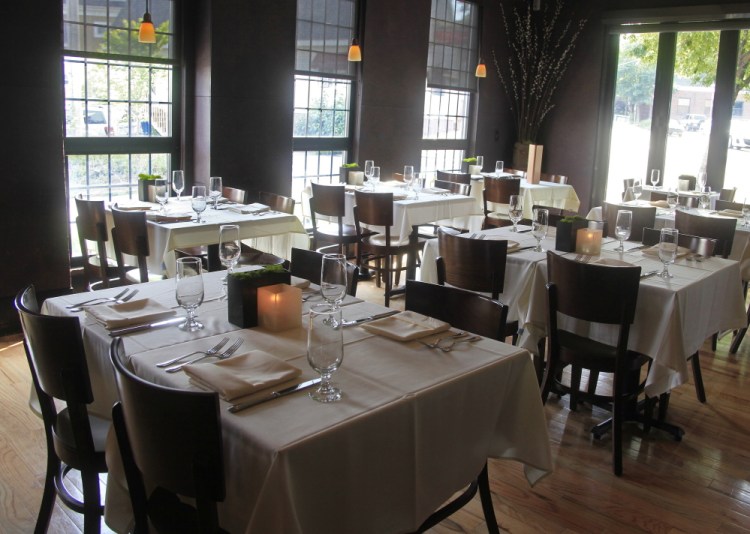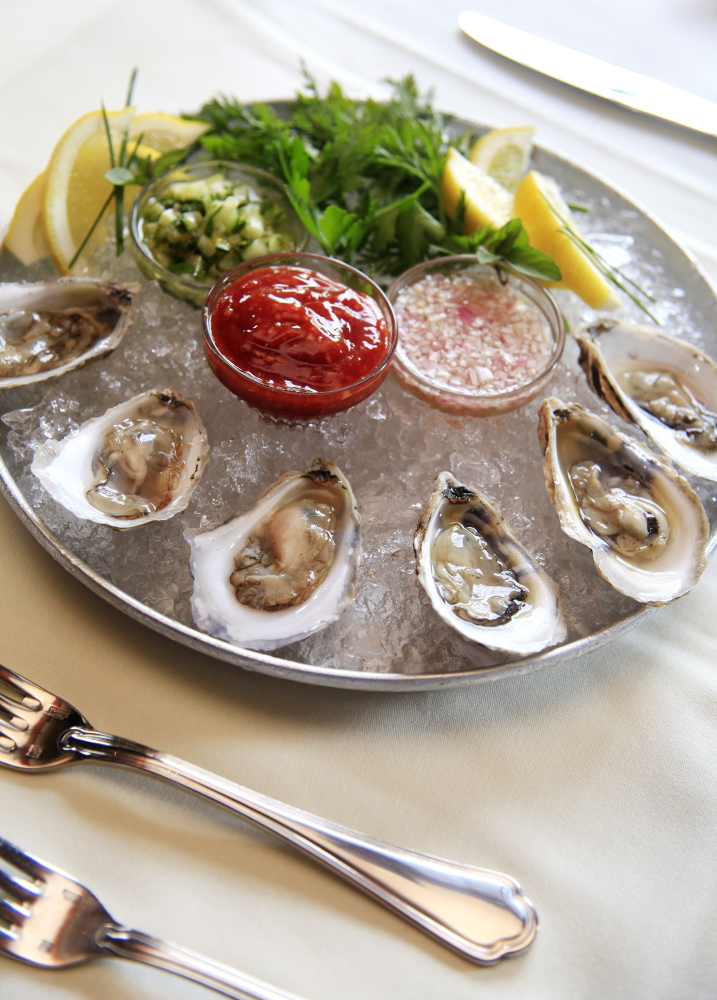It’s easy to forget that Kittery, with its outlets and naval shipyard, is the oldest town in Maine, incorporated in 1647. With my guest, Maine writer and editor Genevieve Morgan, I’m visiting here for dinner at Anneke Jans, a neighborhood bistro in the heart of the old downtown on Wallingford Square at the mouth of the Piscataqua River. It’s named for a woman said to have owned 62 acres in lower Manhattan in the 1630s, but her descendants were never able to claim rights to it, despite numerous lawsuits.
The allure of family land is powerful, and Gen’s family has been luckier than that of Anneke Jans’. On the way, we stopped at Ram’s Head, her grandparents’ lovely farm on 360 acres on the York River, 20 acres of which has recently passed to the grandchildren. “Once farmland is gone, it’s gone,” she says. “So our generation is very motivated to protect this valuable acreage for the future.”
Gen and I settle into the bistro’s comfortable ambiance of dark wood and white tablecloths, seated by one of the large screened picture windows facing the square. We’re excited to see what new executive chef Lee Frank (formerly of Arrows and MC Perkins Cove in Maine, and Lark Creek Inn in California) is doing to renew a menu that’s been a favorite with residents and visitors since the restaurant opened in 2005. I’d read that the signature PEI mussels aren’t going anywhere, but that Frank was exercising his French-inspired experience at Arrows in a duck confit appetizer with French onion broth and steak frites with an escarole and parsley gremolata.
The ever-changing menu reflects neither of the new items, though the duck may have been a special I missed in the excitement of ordering Moscow Mule cocktails served correctly in copper cups. Gen is drawn to the house-made fettuccini with corn, heirloom tomatoes and basil pesto, and I to the crispy-skin salmon with potatoes, asparagus and pickled beets. However, Gen, a friend I’ve known since we were on the board of Portland’s Telling Room, says, “We’re always encouraging each other out of our comfort zones – let’s try something more avant-garde.”
We thus decide on two of the most mysterious-sounding entrees before starting with local Little Bay oysters on the half shell ($2.75 each). Gen has recently begun eating oysters and is pleasantly surprised by the salty flavor enhanced with cucumber vinaigrette and mignonette toppings. The chicken confit appetizer ($10) turns out to be my favorite dish of the evening, a crispy-skinned thigh that falls off the bone into a bed of tender corn succotash with cherry tomatoes and the sweet confit broth.
I’m telling Gen how excited I am about the July publication of a book she’s been working on for as long as I’ve known her. The first in her “Five Stones” trilogy, “The Fog of Forgetting” is an adventure-fantasy for both middle-graders and adults that is set on the coast of Maine, “in an imaginary but parallel land that’s rich with history and steeped in lore,” she says. We’re also discussing the food-related books she’s acquired as an editor at Islandport Press, including “How to Cook a Moose,” a culinary memoir that’s coincidentally by last week’s Dine Out guest Kate Christensen, and “A Pie for All Seasons,” a collection of sweet and savory pies by Elise Richer.
The mixed greens salad ($9) arrives, a gorgeous display of paper-thin carrot strips and colorful circular slices of watermelon radish over romaine topped by sliced beets, chives and sunflower seeds. I find the homemade buttermilk dressing a little weak, so the flavors of the vegetables don’t pop for me, but Gen’s green tomato and avocado gazpacho ($9) is unique and refreshing, with a bright citrus aftertaste. “It’s tangy like white wine,” she notes. “It makes the sides of the tongue tingle.”
Our entrees arrive on big square plates. At first we’re confused; the seared half of the duo of tuna ($26) is gray the way pork can be, while the pork flat iron ($27) is pink like tuna should be. The first dish is topped by half grapes and the second by half cherries – it feels like opposite day. Our waiter explains that the decorative line of yellow gribiche on the tuna plate is a tartar sauce with capers and eggs but without the mayo, which turns out to be the most flavorful part of the dish. The pork is served over oyster mushrooms, fingerling potatoes and crispy salty kale, all of which I enjoy more than the meat itself.
“Maybe we should have gone with our first choices,” Gen suggests. A friend of my husband’s who’s been a fan of Anneke Jans since it opened told me that Frank, who started this year, hasn’t hit all dishes home yet but is making improvements on last year’s menu.
Our chocolate tasting and exploration of caramel desserts (both $8), made by pastry chef Deb Chag, are decadent and beautifully displayed on horizontal white plates with a mint garnish, but don’t taste as fresh and extraordinary as we hoped – though we still manage to do some damage.
“My truck is parked across the street,” our attentive waiter jokes as he takes the dessert plates and empty wine glasses. “I can load you right in back.”
Despite the hiccups in the menu, Anneke Jans is the kind of place where you can sit and talk all night as the fine people of Kittery come and go around you. “It was the company and setting that made the meal for me, not the food,” Gen recaps. “But I’m plenty full nonetheless.”
And I’m inspired because, struggling as I am to write a book myself, I don’t know how Gen manages to do it all – write her books, work at Islandport Press, take care of the family farm in York and her husband and two boys in Portland – but somehow she does it all with passion.
That’s the theme here, after all. With enough passion and time, eventually you’ll find a way to achieve the things that matter – write that book, save the family farm, perfect a menu. Even the descendants of Anneke Jans might someday get back their land. Here’s to the trying.
Next week: Farm-and-sea-to-fork off the coast of the Blue Hill Peninsula with Eliot Coleman and Barbara Damrosch.
Melissa Coleman is a Maine writer whose work includes “This Life Is in Your Hands: One Dream, Sixty Acres and a Family Undone,” her memoir about coming of age during the 1970s back-to-the-land movement.
Copy the Story LinkSend questions/comments to the editors.





Success. Please wait for the page to reload. If the page does not reload within 5 seconds, please refresh the page.
Enter your email and password to access comments.
Hi, to comment on stories you must . This profile is in addition to your subscription and website login.
Already have a commenting profile? .
Invalid username/password.
Please check your email to confirm and complete your registration.
Only subscribers are eligible to post comments. Please subscribe or login first for digital access. Here’s why.
Use the form below to reset your password. When you've submitted your account email, we will send an email with a reset code.